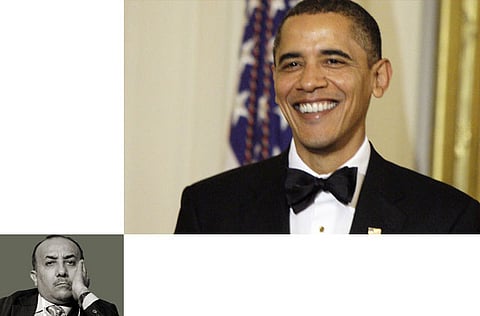Barack Obama’s shortsighted Middle East strategy will backfire: US President achieved nothing on a two-state solution or Syria
US president achieved nothing substantial on a two-state solution or Syria

What a different Middle East US President Barack Obama visited last month compared to four years ago when he made his conciliatory and fence-mending speech to the Muslim world from Cairo University. The Arab world is imploding. Israel is cocooned in its shell and wall. The Arab Spring has become Arab chaos.
The visit came on the 10th anniversary of the devastating US-led invasion of Iraq, a country that is unravelling and faces civil war. Iran, though weakened and besieged, is still meddling in the affairs of many Arab states, the latest being Saudi Arabia, which discovered a spy cell. The Sunni-Shiite rift is becoming dangerous. Syria has become a slaughter house and the violence is spilling over into the wider region, creating mayhem and giving extremists the upper hand.
The real question is how high do the Middle East and its myriad crises and flashpoints figure in Obama’s foreign policy agenda and priorities given his domestic focus. The US has withdrawn from Iraq, downgraded the Arab-Israeli conflict, is preparing for a full withdrawal from Afghanistan and is limiting its presence in the Arabian Gulf to one aircraft carrier.
The Obama administration has its plate full: A confident China, a resurgent Russia and a recklessly defiant North Korea. In the midst of this, Obama is entangled in a tug of war with the belligerent Republicans and is implementing budget cuts or sequestrations.
Obama’s much delayed visit to Israel and the Occupied Territories was welcomed by Israelis more than Palestinians. From the outset, however, there were no great expectations about the ‘listening and taking stock tour’. The visit lacked any strategic depth. There were no plans or initiatives for a two-state solution, dealing with the mayhem in Syria, handling change in the Arab Spring states, and allaying the fears of the Gulf Cooperation Council states, America’s formidable allies in the region.
In his charm offensive visit to Israel, Obama came out swinging. He put his oratory skills to good use and was able to win the hearts and minds of Israelis, shored up his sagging image and cleared most doubts about his commitment to Israel. Clearly, Obama went out of his way to reassure Israelis of his commitment to their security. He even spoke Hebrew on more than one occasion.
It was more of a ‘schmoozing’ visit. I borrow this word from Daniel Levy’s excellent take in Foreign Policy on Obama’s uneventful visit. Levy captured the main theme of the argument in his column Nice Speech Mr President ... no what?
He said all the right things in occupied Jerusalem, and appealed to the Israeli public in an interesting way. He hit all the buttons in endorsing Israel’s own narrative — as one would expect from a visit that has resembled a schmooze-a-thon — but he added a surprising twist. Obama offered Israelis a blank cheque with a health warning: ‘Use with caution’.
He essentially assured the Israelis that the US will stand shoulder-to-shoulder with them regardless of what Israel does or the violations it perpetrates against the Palestinians. The blank cheque seeks to reassure the Israeli leadership and people about his genuine commitment to Israel. So Obama’s visit revolved around improving his image.
He could not even stick to his own narrative and beliefs about a two-state solution, which he advocated since day one of his presidency five years ago. Then, Obama was vehement about the need to freeze colony expansion because it would derail a two-state solution. This time, he did not demand a freeze on colony expansion. The best he could manage was: Colony building in the West Bank did not “advance the cause of peace”, stopping short of demanding a construction freeze to enable negotiations to resume.
It is simply empty rhetoric and handing Israel a blank cheque to do whatever it sees fit. For sure, Obama saw all those Israeli colonies on Palestinian land while flying over the West Bank back and forth to Ramallah. As one analyst put it, “Obama couched his peace argument in support of a two-state deal on three axes: that it is necessary, just, and possible”. How can Obama square that if Israel continues to change the facts and reality on the ground?
On Syria, it is unfortunate that after two bloody years and more than 70,000 deaths, there is no strategy to end the mayhem. In Jordan, on the last leg of his visit, all Obama could do was warn that Syria could become an “enclave for extremism”. Obama said that when Bashar Al Assad loses power, “I am very concerned about Syria becoming an enclave for extremism. Extremism thrives in chaos and failed states.” Earlier in occupied Jerusalem, Obama warned that the use of chemical weapons in Syria by Al Assad’s regime would be a “game changer”.
It is unfortunate that Obama’s visit failed to have an impact in a volatile region. The lack of US leadership and resolve gives credence to the argument that the US has downgraded the region in favour of other priorities. This shortsighted strategy could return to haunt not only the US, but the region and wider world.
Professor Abdullah Al Shayji is the chairman of the political science department, Kuwait University. You can follow him on Twitter at www.twitter.com/docshayji
Sign up for the Daily Briefing
Get the latest news and updates straight to your inbox



